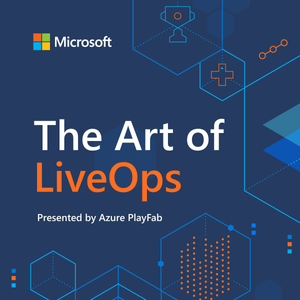
Episode 42: What Can Games Teach Us About UI Design? With Felix Park (Part 1)
11/16/20 • 25 min
Key Points From This Episode:
- Felix introduces himself and what he does as a game designer.
- Felix explains what it means to be a game designer, using a door in a game as a metaphor,
- Game development and how it parallels with user experience or user interface design.
- How Felix strives towards guiding people through an optimal and less frustrating experience.
- Felix explains what a AAA game is – they are the big-budget, summer blockbusters of games.
- Hear more about what led Felix to game design.
- Going into gaming, Felix had some programming knowledge from his HTML coding hobby.
- How Felix leads a user to make certain decisions, from lighting and UI to manipulating time.
- Felix defines affordances as what’s possible with an object as expressed through its design.
- Felix outlines some examples of how game designers include prompts to guide players.
- Restrictions and repetitions are introduced throughout a game to establish a design language and what the affordances are for the user.
- Felix explains how he balances high intensity difficulty with ease of play through play testing.
Tweetables:
- “We have to constantly strive to make sure that people are being guided towards an optimal, not so frustrating experience. Unless we do want to frustrate them, in which case that's an entirely different design challenge. The goal is to make sure that anybody can play our games with the minimum amount of direct interference or touch on that”. — @uhfelix [0:05:07]
- “Games are this thing you just make up in [their] entirety. Down to the very weird, basic, physical elements, you can use all of them to influence people.” — @uhfelix [0:14:54]
- “Affordance is this concept of how does the design communicate its use to the user? In games, it’s very important because in the virtual world anything is possible. You want to be able to really limit the space of possibility within the player's mind, or else they'll be stuck. They’ll be at a loss as to what to do to progress, or move forward, or to accomplish goals.” — @uhfelix [0:17:57]
- “If you have a lot of focus on player experience, then that would lead you to integrate more player feedback into that process.” — @uhfelix [0:25:11]
Links Mentioned in Today’s Episode:
- Felix Park on Twitter
- Felix Park
- The Design of Everyday Things
- Enjoy the Vue on Twitter
- Enjoy the Vue
Special Guests: Felix Park and Ringo Kim.
Key Points From This Episode:
- Felix introduces himself and what he does as a game designer.
- Felix explains what it means to be a game designer, using a door in a game as a metaphor,
- Game development and how it parallels with user experience or user interface design.
- How Felix strives towards guiding people through an optimal and less frustrating experience.
- Felix explains what a AAA game is – they are the big-budget, summer blockbusters of games.
- Hear more about what led Felix to game design.
- Going into gaming, Felix had some programming knowledge from his HTML coding hobby.
- How Felix leads a user to make certain decisions, from lighting and UI to manipulating time.
- Felix defines affordances as what’s possible with an object as expressed through its design.
- Felix outlines some examples of how game designers include prompts to guide players.
- Restrictions and repetitions are introduced throughout a game to establish a design language and what the affordances are for the user.
- Felix explains how he balances high intensity difficulty with ease of play through play testing.
Tweetables:
- “We have to constantly strive to make sure that people are being guided towards an optimal, not so frustrating experience. Unless we do want to frustrate them, in which case that's an entirely different design challenge. The goal is to make sure that anybody can play our games with the minimum amount of direct interference or touch on that”. — @uhfelix [0:05:07]
- “Games are this thing you just make up in [their] entirety. Down to the very weird, basic, physical elements, you can use all of them to influence people.” — @uhfelix [0:14:54]
- “Affordance is this concept of how does the design communicate its use to the user? In games, it’s very important because in the virtual world anything is possible. You want to be able to really limit the space of possibility within the player's mind, or else they'll be stuck. They’ll be at a loss as to what to do to progress, or move forward, or to accomplish goals.” — @uhfelix [0:17:57]
- “If you have a lot of focus on player experience, then that would lead you to integrate more player feedback into that process.” — @uhfelix [0:25:11]
Links Mentioned in Today’s Episode:
- Felix Park on Twitter
- Felix Park
- The Design of Everyday Things
- Enjoy the Vue on Twitter
- Enjoy the Vue
Special Guests: Felix Park and Ringo Kim.
Previous Episode

Episode 41: From Individual Contributor to Manager with David Ashe (Part 2)
Key Points From This Episode:
- Ben kicks things off by saying it’s important not to take manager positions for the sake of advancement in our own careers.
- David talks about the issue of job titles, and the retention problem that tech companies have.
- Amal weighs in on the retention problem – it can be resolved by having a good manager.
- The importance of retention and having a constant feedback culture within organizations.
- Management is an art, but it is also a science – it’s more complicated than engineers think.
- Ari weighs in on whether or not she want to shift into a manger role – she says she is torn.
- While someone can get a PhD in management, managers very rarely do – it tends to be the hot shots that get promoted into the role.
- It’s rare to find someone with strong technical skills and good people management skills.
- It’s common to see managers go from IC to manager, back and forth, because of burn out.
- How manager’s know they are doing a good job: David is trying to ensure that people on his team are improving or getting promoted.
- Why silence may actually be profound positive feedback that you’re being a great manger.
- You should have a team that operates effectively without you, not a bottleneck hero culture.
- Ari believes the most important qualities of a good manager are empathy and understanding.
- Tessa explains why she wouldn’t want to be a manager again soon, because of the overload.
- David shares his perspective from when he was an IC, what he needed from his manager.
- Amal’s picks include TV shows, I May Destroy You and Lovecraft Country on HBO.
- Ari’s pick is a Netflix movie called Freak Show, a gender-nonconforming coming-of-age story.
- Tessa’s picks: Malinda Herman, Mike and Maddie on YouTube and a font called cardigraph.
- David recommends hey.com and Dating Around on Netflix, while Ben’s picks are a book, and a game called Hades.
Tweetables:
- “Take the time to invest in your learning. If you are a new manager, take manager training. A lot of companies don't offer it, a lot of companies do. Try to get your company to pay for a formal training. Read books. Find a mentor. You're going to need peer mentors, people that have been doing this job for longer than you within your company. It's also really good to get outside perspective, so you know you're not echo chambering bad management cultures.” — @nomadtechie [0:06:39]
- “Unfortunately, if you're a great manager, people may in fact leave faster, because you're going to develop them, and the market is going to scoop them up. You may not have those feedback cycles where, when they leave, they would say that you've been a great manager. But maybe not. Silence might in fact be profound positive feedback, you're being a great manager.” — David Ashe [0:18:17]
Links Mentioned in Today’s Episode:
- David Ashe on LinkedIn
- David Ashe Email
- David Ashe on GitHub
- Amaal Hussein on Twitter
- Amal Hussein Email
- Ben Hong Email
- Square Software Engineering Career Ladder
- TINYPulse
- I May Destroy You
- Lovecraft Country
- Freak Show
- Malinda Herman on YouTube
- Mike and Matty on YouTube
- Hey
- Dating Around
- Nonviolent Communication
- Difficult Conversations
- Hades
Next Episode

Episode 43: What Can Games Teach Us About UI Design? With Felix Park (Part 2)
Key Points From This Episode:
- Felix starts with an example of designing a bench explosion and its unpredictable variables.
- Where to include heavy-handed guidance in a game is usually borne of player testing.
- Felix believes the number one fallacy of designers in any field is that they extend their personal viewpoint on their design being universal.
- Focus testing and A/B testing are ways to create accessible experiences in mobile games.
- Testing doesn’t have to be formal – it can be as informal as asking a friend for feedback.
- Crunch time and work-life balance: How Felix manages it by keeping to his hours strictly.
- Part of Felix’s decision to go into internal tools programming was less of an emphasis on meeting very strict deadlines.
- Onto picks, Ari’s is a little more abstract this week – quit a job you’re unhappy at.
- Ringo’s pick is the YouTube channel Noclip, which presents various game documentaries.
- Felix’s picks are cooking meatballs or a non-meat alternative, and learning the open source game engine, Godot.
- Felix talks about the resurgence of disc versus digital when it comes to installing games.
- Tessa’s picks are all games: Minna no Gorufu or Hot Shots Golf, The 3rd Birthday, Resident Evil 6, and the Ct.js game editor.
Tweetables:
- “I think the number one fallacy of designers in any field is that the design they've made is understandable and parsable to everyone. They extend their own personal viewpoint on that design as being universal.” — @uhfelix [0:02:52]
- “When I say testing, I don't explicitly mean like A/B testing or focus testing. It can also be something as informal as like just asking someone else, a co-worker, a friend, family, to just sit down and play your game and have them give their honest feedback. That’s it.” — @uhfelix [0:06:58]
- “I try to keep to my hours very strictly. It’s a lot of discipline to be able to do that and [it takes] a in your employer to recognize that you do have the boundaries and limits you're setting, and they need to respect that. I don't think I would work for any company that would overemphasize the need to stay at work over actual production.” — @uhfelix [0:08:29]
Links Mentioned in Today’s Episode:
- Felix Park on Twitter
- Felix Park
- Noclip on YouTube
- Godot Game Engine
- Hot Shots Golf: World Invitational Game
- The 3rd Birthday
- Resident Evil 6
- Ct.js Game Editor
- Enjoy the Vue on Twitter
- Enjoy the Vue
Special Guests: Felix Park and Ringo Kim.
If you like this episode you’ll love
Episode Comments
Generate a badge
Get a badge for your website that links back to this episode
<a href="https://goodpods.com/podcasts/enjoy-the-vue-35371/episode-42-what-can-games-teach-us-about-ui-design-with-felix-park-par-9882372"> <img src="https://storage.googleapis.com/goodpods-images-bucket/badges/generic-badge-1.svg" alt="listen to episode 42: what can games teach us about ui design? with felix park (part 1) on goodpods" style="width: 225px" /> </a>
Copy




